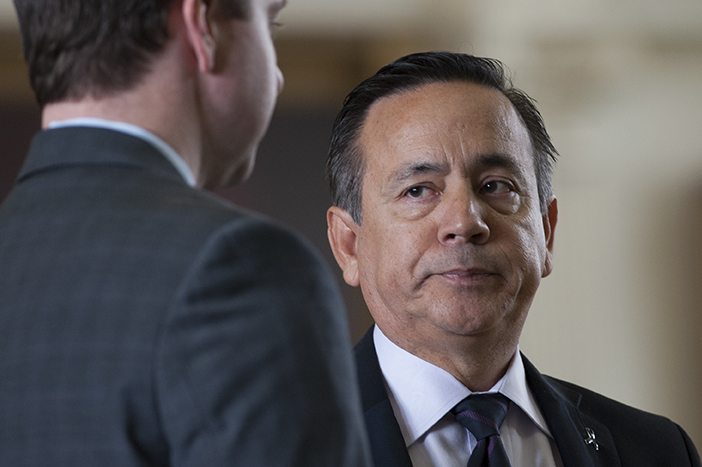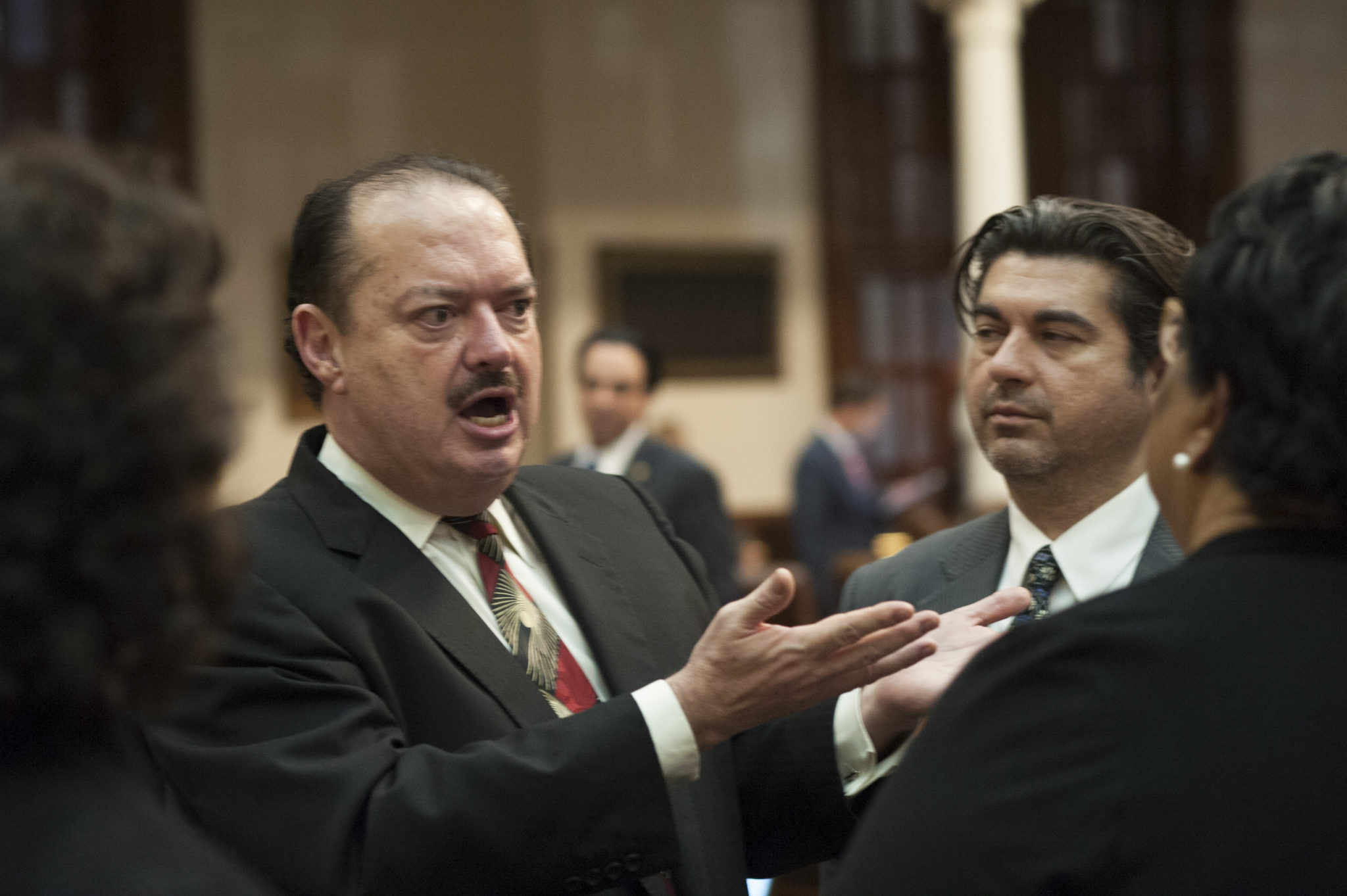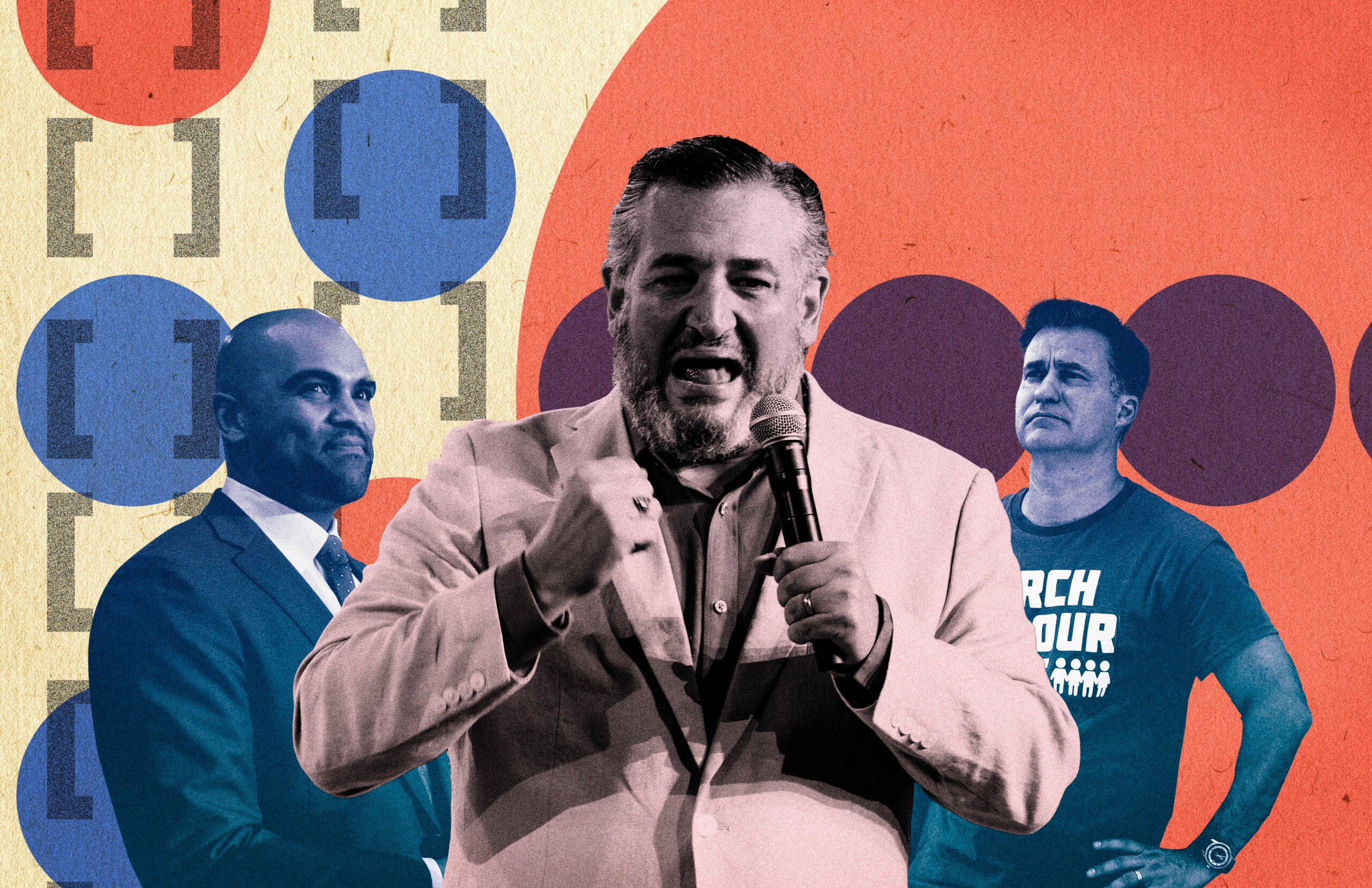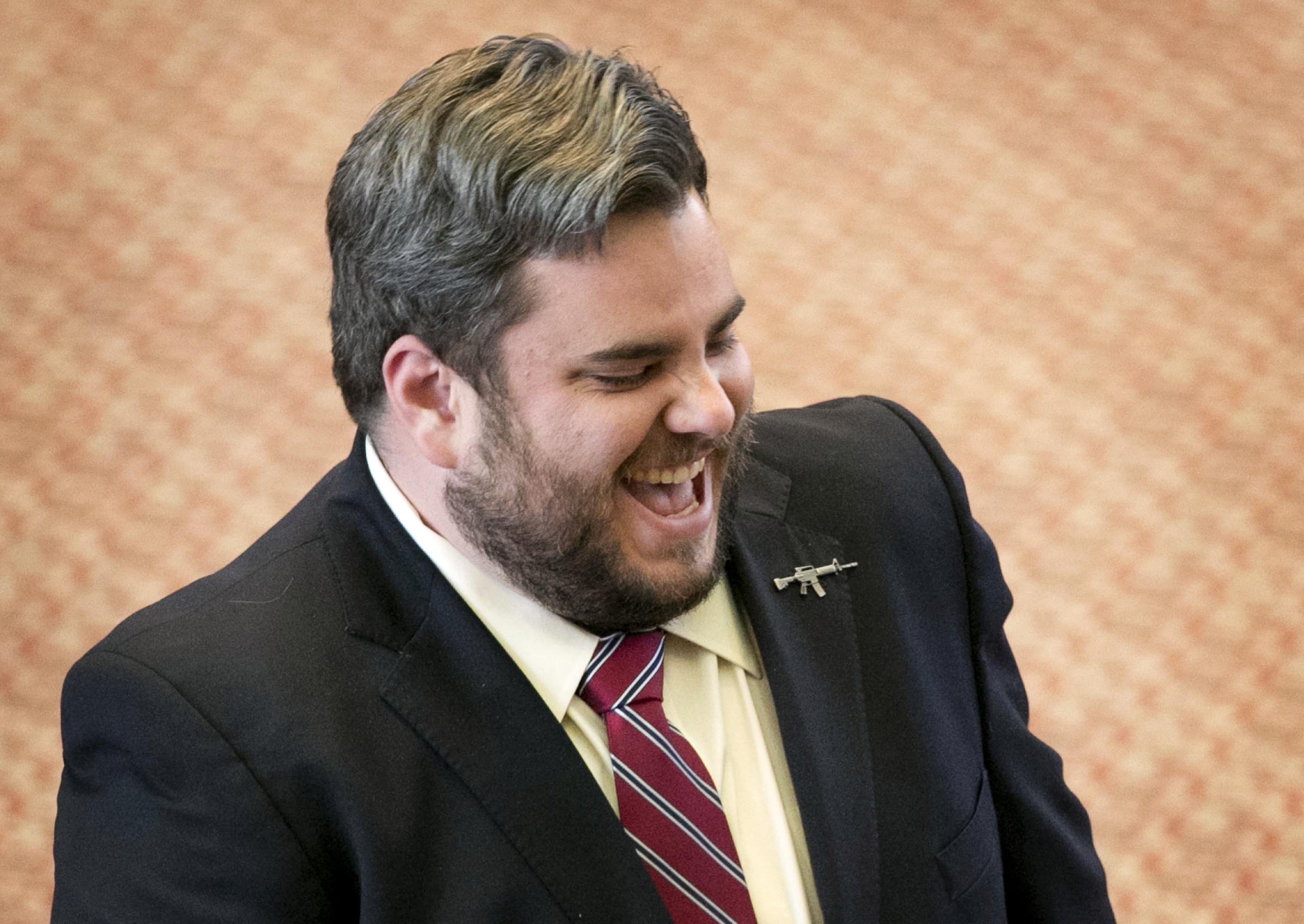
Six Texas Political Players Who Lost Power in 2018
A diverse and bipartisan ensemble of politicians and groups were rudely awakened as they were wrested from or kept out of power in 2018.

Above: Left to right: Stan Stanart, Pete Sessions, Carlos Uresti
Power is a funny thing. One minute you have it; the next it’s gone. Sometimes it’s taken forcefully; other times it’s given away. In Texas, the ruling Republican party has grown comfortable in its power, while the futile Democratic opposition has often become complacent with its limited influence. There’s a long list of old, white conservative men who have taken their power for granted, never facing serious electoral challenges. And where Democrats have found power in Texas, they’ve often abused it or squandered it. That paved the way for several political upsets in 2018.
Meet Texas’ (Out of) Power Players: a diverse, bipartisan ensemble of six politicians and groups that were rudely awakened as they were wrested from (or kept out of) power in 2018.
1) Pete Sessions

Pete Sessions was living the good life. He’d been sitting comfortably in his north Dallas perch of power in the 32nd Congressional District, a gerrymandered bastion of country club Republicanism, since 2002. Over the course of his nearly two-decade career, the silver-haired politician accumulated power like algae on a swamp. He guided the GOP takeover of the House in 2010 and was rewarded with the role of legislative gatekeeper when he became chair of the House rules committee. He used the clout as one of the most powerful members of Congress to serve as a vessel for big businesses. As the Observer reported earlier this year, he spent thousands wining and dining corporate donors at exclusive golf clubs and ski resorts.
Sessions was untouchable. In 2016, Democrats didn’t even bother to field a candidate to challenge him. But Hillary Clinton ended up winning his changing district, instantly making him a top 2018 target. Facing off against Democratic newcomer Colin Allred, a well-funded former NFL player with hometown roots, he called in every favor he could from his Republican colleagues and an alphabet soup of corporate PACs. But he was still ousted by more than 5 percentage points.
Ol’ Pete may be joining another prominent Sessions (remember Jefferson Beauregard?) who is also no longer in power, but his good deeds surely won’t be forgotten as he starts shopping around his résumé to corporate boards and lobbying shops.
2) Empower Texans

When Jonathan Stickland and Briscoe Cain become your top generals, you know your political coup is in trouble.
Tim Dunn, the ultra-wealthy oilman from Midland, has made it his mission to shape the Texas Republican Party in the image of Louie Gohmert on uppers. Despite spending tens of millions of dollars, Dunn has failed. Sure, he’s installed a handful of state representatives and senators. But in order to gain power, you need to be a credible threat. Empower was, at one point, successful in creating that illusion. However, 2018 exposed the venture to be a very expensive paper tiger.
In the primaries, Empower failed to defeat many of its top targets, like moderate Republican Sarah Davis. When they did succeed in driving out mainstreamers, many of their chosen candidates, such as far-right vaccine truther Lisa Luby Ryan, got smeared in the general. Empower’s leading luminaries, including Matt Rinaldi and senators Konni Burton and Don Huffines, were similarly washed away by a blue wave in the Metroplex. The writing on the wall was legible enough that Representative Jeff Leach, who nearly lost hold of his purpling Plano district, promptly absconded from the insurgent House Freedom Caucus after the election.
What remains is a well-financed assortment of whackos with few friends and little power. That dearth of influence was accentuated by Empower foe and state Representative Dennis Bonnen’s seemingly uninhibited ascension to the speakership. More than a decade into their political project, Tim Dunn and co. are still tilting at government-subsidized windmills.
3) Bexar County Democrats

Want to understand the dysfunction and ineptitude of Texas Democrats? Look no further than Bexar County, where the local party is dead broke and mired with infighting. It’s a small miracle that Democrats were able to flip 24 county seats in November. But they still managed to bungle several other potential pickups.
After felon Carlos Uresti resigned from his San Antonio state Senate seat this year, Pete Gallego and the local party apparatus managed to lose the special election runoff, handing over a predominately Hispanic district that Democrats have held for 139 years to Republican Pete Flores. Ultimately, losing that seat allowed Lieutenant Governor Dan Patrick to keep his GOP supermajority in the upper chamber, as Democrats picked up two Dallas senate districts in November.
On top of that, San Antonio native Gina Ortiz Jones narrowly lost her bid to oust “moderate maverick” Will Hurd in the 23rd Congressional District. In a blue wave year, the perennial swing district that stretches from San Antonio to the western border should have been a gimme. But Ortiz Jones ultimately lost by about 1,250 votes — a margin that a functioning local party in the most important part of the district easily could have made up.
Then there’s Julián Castro, the Alamo City’s hometown hero. Along with his twin brother, the supposed face of the Democratic Party’s future decided to sit out the most important election cycle of his career because he didn’t want to risk sullying his profile with a statewide loss in Texas. Then he watched from the sidelines as some nobody from El Paso became a political phenom and now sits atop the 2020 presidential wishlists.
Castro also wants to run for president and is scrambling to lay down his marker in a crowded Democratic primary field, as if nothing has changed since he became a party darling in the late 2000s. The thing is, political power doesn’t last if you try to bottle it up to use at the most opportune time.
4) Stan Stanart

In the end, Stan Stanart, the notoriously incompetent and conspiratorial Harris County clerk charged with administering elections in one of the country’s largest counties, was no match for George Soros’ shadowy electoral meddling. At least that’s probably what he’s telling himself after getting shellacked by his Democratic opponent, Diane Trautman. Stanart had accused Soros of trying to “control” Houston elections — part of the ongoing villainization of the Jewish liberal billionaire by leaders of the Texas GOP.
Of course, Stanart wasn’t the only Republican to get booted in Harris County. In the final year of straight-ticket voting in Texas, Democrats swept out all Republican officeholders, including the popular, moderate County Judge Ed Emmett. But Houston voters held a particular wrath for Stanart. While Emmett narrowly lost his race with 48 percent of the vote, Stanart garnered just 43 percent.
Stanart was an increasingly rare bird: a raving nutjob who clung on to power in a highly consequential urban elected office simply by virtue of low midterm turnout. With his loss, that species is now on the verge of extinction.
5) René Oliveira

René Oliveira is no stranger to power. Beginning in 1981, he has served 17 terms representing Brownsville in the Texas House. He was seen as the ultimate distillation of politics in the Rio Grande Valley, which has a long and rich history of corruption.
His critics accused him of being a self-serving tool for the Austin lobbyists and industry PACs that filled his campaign coffers, all while doing little to help his district — the most impoverished in the state. Instead, they said, Oliveira used his power for himself. Over the past decade, according to the Texas Monitor, he used campaign funds to lease personal cars, furnish his swanky Austin apartment and live the high life. Using campaign contributions, Oliveira spent more than $16,000 at liquor stores and ran up tabs of more than $41,000 at Cobbleheads Bar and Grill in Brownsville.
His critics saw an opening. He faced two primary challengers in March and was ultimately forced into a runoff against Cameron County Commissioner Alex Dominguez. Weeks before the runoff, he was arrested and charged with drunk driving in Brownsville after hitting another car and then reportedly handing the driver his business card and promising “that he would take care of everything.”
Apparently, voters finally got fed up with Oliveira’s idea of constituent services. Dominguez won the runoff by more than 14 points. But whether Oliveira’s loss gets the rest of the entrenched Valley Democrats to change their ways remains to be seen.
6) Texas’ Besieged Cadre of Congressional Republicans

There will be two fewer Republican U.S. House members from Texas reporting for duty in January. But after nearly 10 years in power, the 23 remaining House Republicans will find themselves in an uncomfortable position. With minority status comes far less power. When the Democrats take over next month, the Texas Republican delegation will lose seven committee chairmanships.
Those Texas House Republicans who didn’t hold chairmanships often had coveted spots on influential committees and subcommittees — and they, too, will feel the cold isolation that comes with minority status. Meanwhile, the bevy of Republican freshman who replaced retiring incumbents in safely red districts will have it even worse: they’ll be out of power and at the bottom of the pecking order, stuck with crappy offices and obscure committee appointments.
A rash of GOP members may decide to just hang it up come 2020, especially the handful of incumbents who will have to actually try to get re-elected after they saw their once-impenetrable districts turn purple in November.
It’s not very enjoyable to be a politician without power, but maybe Republicans in Washington can learn some coping skills from Democrats in the Texas Legislature.



